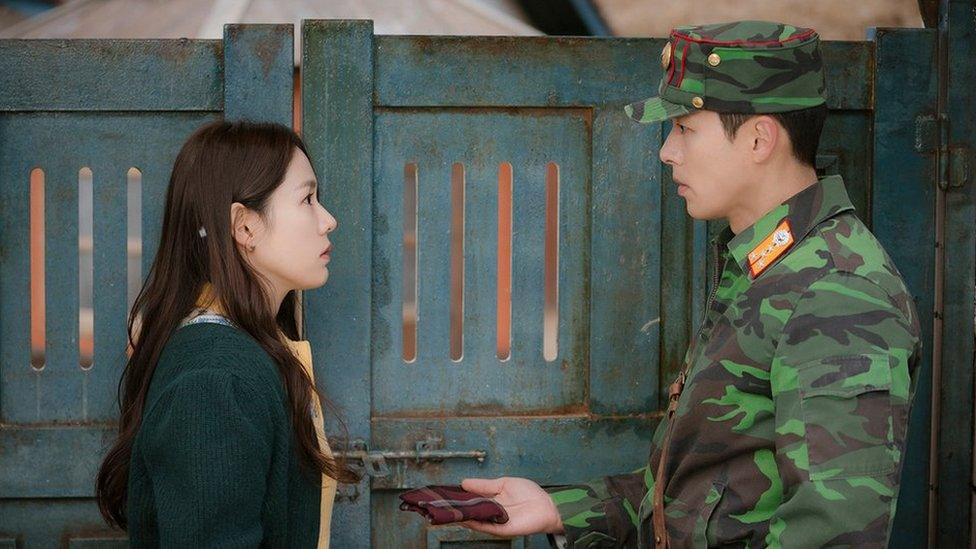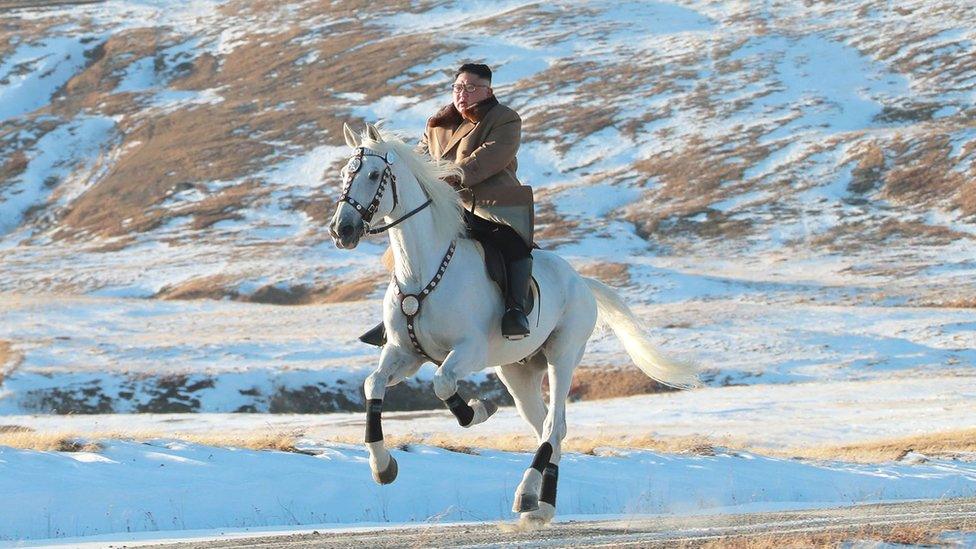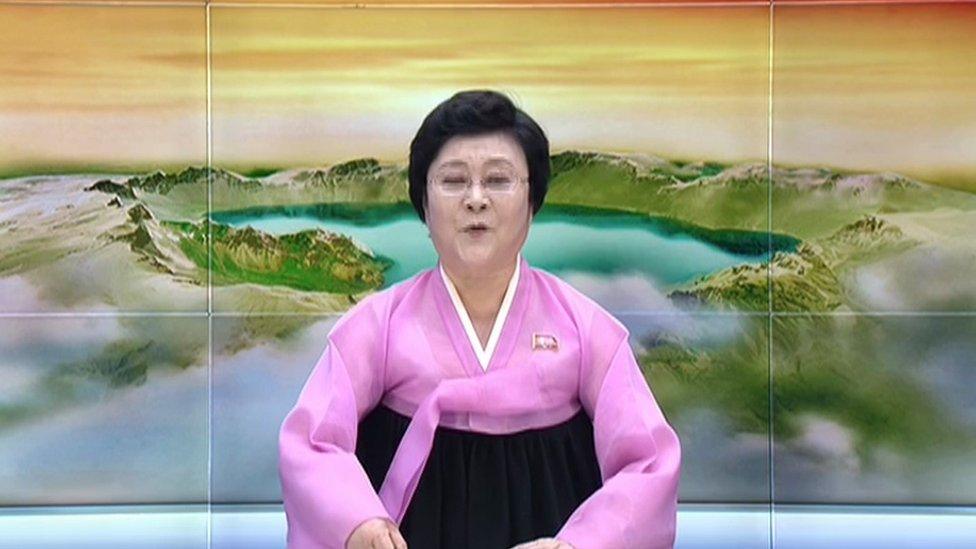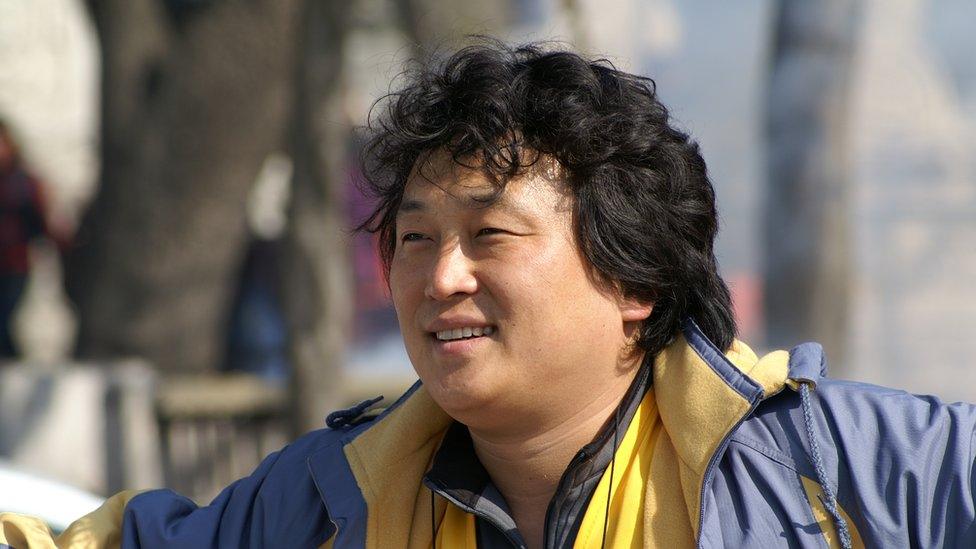North Korea blasts South's 'insulting' dramas and films
- Published

Crash Landing on You tells an inter-Korean love story
North Korean media has lashed out at recent South Korean dramas and films for showing the North in a bad light and engaging in "atrocious provocation".
The Uriminzokkiri website didn't mention specific titles, but the criticism is perceived in the South to be aimed at the latest TV drama series Crash Landing on You and the blockbuster action movie Ashfall.
"Recently, South Korean authorities and film producers have released anti-republic films and TV dramas, external that are deceptive, fabricated, absurd and impure, putting all their efforts into making strategic propaganda," the commentary said.
North Korea is very sensitive to any criticism of the country. Relations with the South have deteriorated over the past year, despite North Korea embarking on an unprecedented path of international diplomacy with Seoul and Washington in 2018.
'Unbearable insult'
Action movie Ashfall centres around Mount Paektu - a dormant volcano in North Korea which holds a special place in Korean culture on both sides of the border - which suddenly erupts causing severe earthquakes across the peninsula.
According to the plot, the only way to stop ensuing pandemonium is to deposit an atomic bomb in the depths of the mountain, which explodes and stops the earthquakes.
The idea of someone stealing North Korea's nuclear weapons in order to nuke its sacred mountain probably didn't go down well in Pyongyang.
The ending - a united government overseeing the reconstruction of the Korean Peninsula - might also have caused disappointment.
Ashfall also features the collapse of a building - presumed to be the headquarters of the ruling Workers' Party of Korea in Pyongyang, probably a piece of political symbolism too far for the North.

The North Korean leader rode a white horse on a symbolic visit to Mount Paektu
Mount Paektu has a special place in the country's identity. The peak is considered a sacred place in Korean folklore and it is also part of the propaganda which glorifies the Kim family, who are said to have a "Mount Paektu bloodline".
North Korean propaganda claims "Dear Leader" Kim Jong-il, who died in 2011, was born in a cabin on the mountain.
It's not unreasonable to suggest that the plot of the film caused the "unbearable insult" the article bemoaned.
"It is a pity that movie and programme makers produce such insulting programmes while ditching their integrity, dignity and conscience as artists and are blinded with making money", it said.

Mount Paektu is seen every day on North Korean television as a backdrop in the main news studio
Cross-border rom com
The other possible target of the tirade is TV series Crash Landing on You which has become the latest Korean drama smash hit.
The romantic comedy tells the story of a South Korean heiress who accidently crash-lands in North Korea while paragliding. Her rescue by a North Korean army officer sparks a love story in the backdrop of the inter-Korean division.
The series has been praised for its well-researched and nuanced portrayal of North Korea - something achieved by having a real life North Korean defector as one of the writers.

You may also be interested in:

Some in the South have also criticised it for glamorising the country's reclusive neighbour as a peaceful and liveable place, external, but viewers in the North might have a different take.
North Korea is depicted as an underdeveloped country where people live with frequent power cuts while the elite enjoys a privileged life.
The Uriminzokkiri editorial took exception to those who "turn the tragic division of Korea into a source of entertainment", calling them "misers and human rubbish without any conscience".

Kwak Moon-wan - the defector-turned-film-adviser
It went on to spell out the consequences: "The South Korean government and production houses will pay the price for making and distributing such movies and programmes which are full of manipulation and fiction that insult the reality of the bright situation of the North."
This is certainly not the first time North Korea has been offended by screen fiction.
Pyongyang was infuriated by the 2014 film The Interview, in which a fictional Kim Jong-un is seen naked before dying at the film's climax. A computer hack on Sony Pictures, which made the film, was subsequently blamed on North Korea.
Reporting by Taejun Kang and Krassi Twigg
Next story: New Lenin statue stirs controversy in Vietnam